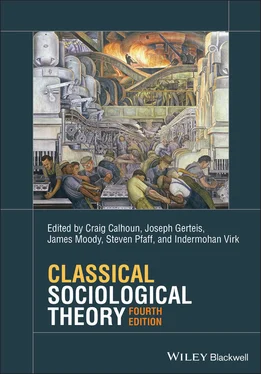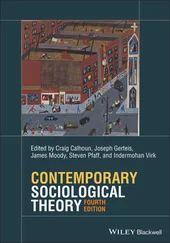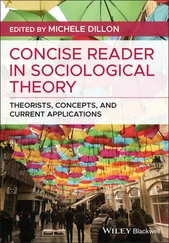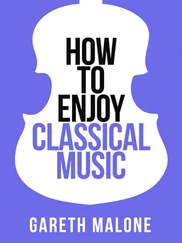Classical Sociological Theory
Здесь есть возможность читать онлайн «Classical Sociological Theory» — ознакомительный отрывок электронной книги совершенно бесплатно, а после прочтения отрывка купить полную версию. В некоторых случаях можно слушать аудио, скачать через торрент в формате fb2 и присутствует краткое содержание. Жанр: unrecognised, на английском языке. Описание произведения, (предисловие) а так же отзывы посетителей доступны на портале библиотеки ЛибКат.
- Название:Classical Sociological Theory
- Автор:
- Жанр:
- Год:неизвестен
- ISBN:нет данных
- Рейтинг книги:3 / 5. Голосов: 1
-
Избранное:Добавить в избранное
- Отзывы:
-
Ваша оценка:
- 60
- 1
- 2
- 3
- 4
- 5
Classical Sociological Theory: краткое содержание, описание и аннотация
Предлагаем к чтению аннотацию, описание, краткое содержание или предисловие (зависит от того, что написал сам автор книги «Classical Sociological Theory»). Если вы не нашли необходимую информацию о книге — напишите в комментариях, мы постараемся отыскать её.
Classical Sociological Theory — читать онлайн ознакомительный отрывок
Ниже представлен текст книги, разбитый по страницам. Система сохранения места последней прочитанной страницы, позволяет с удобством читать онлайн бесплатно книгу «Classical Sociological Theory», без необходимости каждый раз заново искать на чём Вы остановились. Поставьте закладку, и сможете в любой момент перейти на страницу, на которой закончили чтение.
Интервал:
Закладка:
Science:The rise of science transformed the ways in which people understood the conditions of their own lives and relationships as well as the ways they understood astronomy or gravity. At the most general level, and aside from any of its specific discoveries or theories, the scientific revolution centered in 17th-century Europe brought an emphasis on new learning. That is, researchers set out to gather as much knowledge as possible and especially as much empirical knowledge as possible, and to organize it as systematically as possible. Correspondingly, they relied less on tradition. Modern science not only added to knowledge, but also subjected it to questioning and tests.
When early scientists stressed the importance of logic and rational thought on the one hand and empirical evidence on the other, they meant specifically to challenge the notion that we should simply believe what we are taught. They meant that even the most respected authorities and the most venerated traditions could sometimes be wrong. From Galileo to Darwin, this brought controversy with the defenders of established views.
As Robert Merton showed in the 1930s, science depends on a normative order. 1° It is not perfectly free of values, but rather constituted by commitment to specifically scientific values – like the pursuit of truth. Scientists must not be driven primarily by personal gain, must not be subordinated to political power, and must demonstrate ‘organized skepticism’. The starting points of science are to think for oneself, in the most rigorous way possible, and to trust the evidence of one’s senses, especially when it is rooted in experiment or careful, systematic observation rather than casual everyday experience. In addition, science seeks to discern logical order in enormously complex and always incomplete collections of facts.
This is something different from simply offering a summary of established facts. Sociological theories must integrate empirical observations into coherent logical structures explaining patterns of relationship. Think of the difference between stating the price of some object and saying prices are determined by supply and demand. Then add to the picture the way luxury goods gain higher prices by their connection to social status.
Facts always require interpretation – figuring out what they mean in relation to different questions or arguments. Making interpretation systematic is one of the main tasks of theory. Sociological theories must offer empirical claims that can be the basis of either tests (and thereby confirmation, correction, or improvement) or comparisons among theories (and thereby judgment as to which more accurately grasps social reality).
Science advances not just by an accumulation of facts, but through a process the philosopher of science Karl Popper called “conjecture and refutation.” 11That is, a scientist (or someone else) puts forward propositions about how the world works; these are initially conjectures, products of imagination as well as knowledge. They become the basis for hypotheses, and research and analysis confirm or reject them. Thinking about what might explain the facts we see always requires imagination (as C. Wright Mills famously pointed out). But refutation drives the development of knowledge forward as much as imagination. Refutation can be very specific and detailed or much more theoretically basic – like challenging the view that the world is flat or that short term self-interest explains all human behavior. Refutation of an important hypothesis demands rethinking of the whole pattern of knowledge that is organized by a theory. Accordingly, some theorists may resist, even when others think the evidence is clear.
Empirical research also depends on theory to specify the objects of its analysis: how do we know what constitutes a community, for example, or a religion? Appealing to common sense doesn’t solve the problem. Common sense is generally formed on the basis of a particular religion or a particular experience of community – and this is a source of bias if one is seeking knowledge of religion or community in general, in all social contexts. More strikingly, an enormous amount of research has been done on ‘citizens’ and indeed ‘human beings’ by looking only at men – and often white men and European-American men. Theorists like Martineau and Du Bois showed how much this obscured, though it sometimes took white male sociological researchers a long time to pay enough attention.
In its blindness towards gender and race, empirical sociology often tacitly incorporated the assumptions of contemporary society. The founders of the US were not troubled by excluding women from voting because of a general sense that their roles were private not public. They tolerated slavery as a political compromise but also out of racial bias. In both cases, they accepted traditional, inherited ideas as true – just like those who doubted the existence of gravity before Galileo. It is a critical theoretical task to challenge received ideas. This is often pushed these tendencies just as it was a task of social movements to demand political recognition and rights.
Theoretical concepts are like lenses that enable us to see phenomena. Take the concept “self-fulfilling prophecy,” developed by the American sociologist Robert Merton in the mid-20th century. 5This calls our attention to a common aspect of human actions that may take place in many different contexts and which we wouldn’t otherwise relate to each other. Aided by the concept, we can easily see the commonality among teachers’ predictions of students’ future success or failure in school, the labeling of criminals (who then find it hard to get legitimate jobs), and the comments of famous securities analysts on TV about what stocks are likely to go up or down. In none of these cases is the outcome of the predictions independent of the predictions themselves.
In short, sociological theory integrated social thought into social science. It aimed not only to be logically clear but also empirically grounded. However, it remained a question how fully social science could match natural or physical science in testing empirical claims with experiments or formalizing logic in mathematical models. There was no question that some questions about human beings could be approached this way, but could all? First, classical sociological theorists like Max Weber argued that because human beings were creators of meanings, and based their actions on these meanings, not just objective facts, sociology needed to include a method of sympathetic interpretation ( verstehen ). Second, other classical sociological theorists, such as Karl Polanyi, Max Horkeimer, and Theodore Adorno, argued that attempts at perfectly objective accounts of social life usually disguised biases built into the perspectives of the theorists. Polanyi’s example was classical liberal economists who claimed to study universal economic laws were doubly biased. Relations they thought universal – like owning property – were in fact historically produced and different in different settings. Moreover, their analyses were shaped by sympathy for capitalists with property not workers without.
Sociological theories may consider non-social causes for social patterns – like climate or physical geography. But sociological theories on social causes as well as social effects. For example, a biological theory of infection will stress the way viruses reproduce, mutate, and affect host organisms. A sociological theory will analyze the patterns that explain who gets exposed – such as social networks or differences in occupation – who is most vulnerable, and who gets treatment.
Theorists develop concepts with which to grasp social life, identifying patterns in social relations and social action, produce explanations for both specific features of life in society and changes in overall forms of society. They also debate the inconsistencies between different proposed explanations. Theory is thus an indispensable part of sociology, crucial to its standing as a science.
Читать дальшеИнтервал:
Закладка:
Похожие книги на «Classical Sociological Theory»
Представляем Вашему вниманию похожие книги на «Classical Sociological Theory» списком для выбора. Мы отобрали схожую по названию и смыслу литературу в надежде предоставить читателям больше вариантов отыскать новые, интересные, ещё непрочитанные произведения.
Обсуждение, отзывы о книге «Classical Sociological Theory» и просто собственные мнения читателей. Оставьте ваши комментарии, напишите, что Вы думаете о произведении, его смысле или главных героях. Укажите что конкретно понравилось, а что нет, и почему Вы так считаете.












